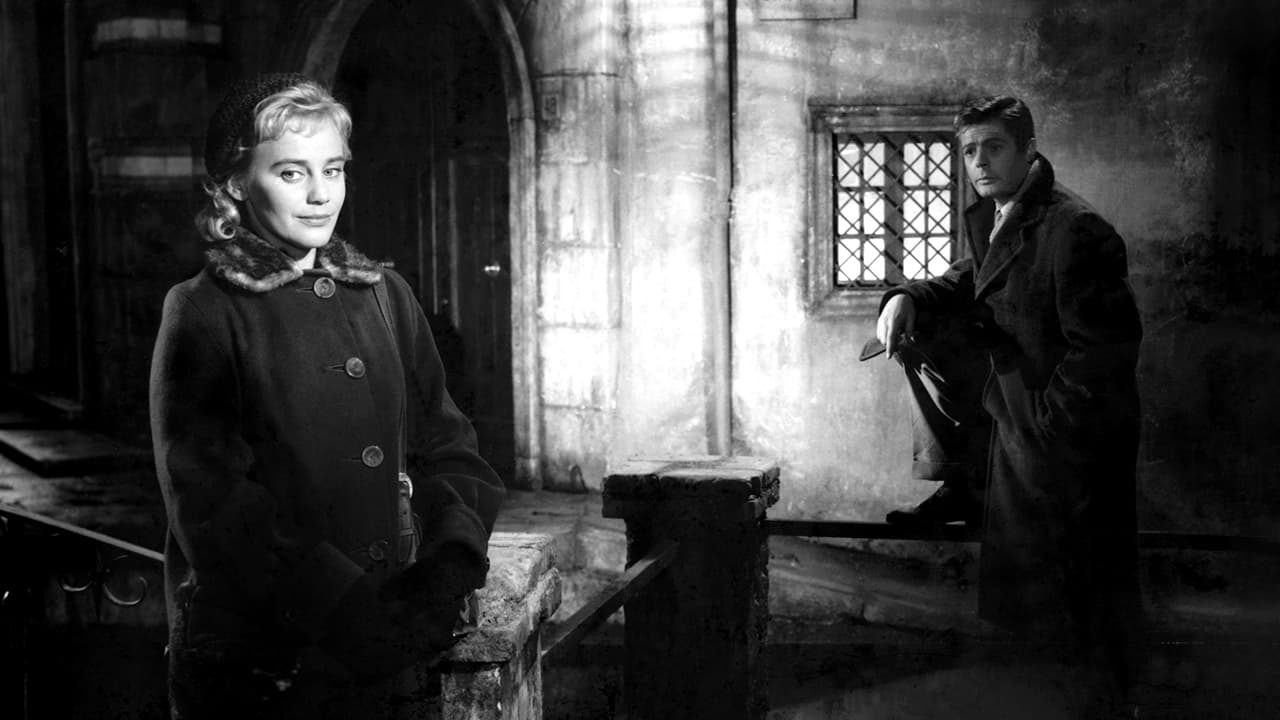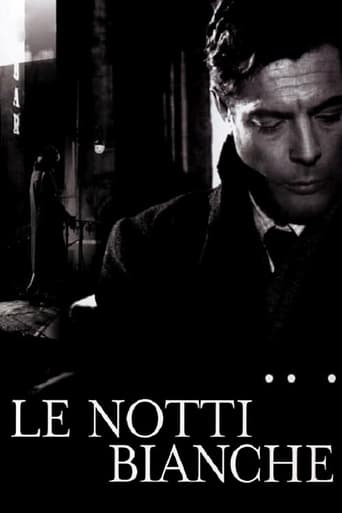

I watched the film many times and thought that the film has been shot at Venezia. Now I'm wathching the film again and saw some street names, like these : Scali delle pietre, Scali del Pesce etc. I began to search these names and found that the film location is not Venezia,but it is Livorno.If you pay attention the street names or place in the film, you could find same location in Livorno. There is very little changes after 60 years.
... View MoreLuchino Visconti directs "White Nights". The film is based on "White Nights", a short story by literature's glowering giant, Fyodor Dostoyevsky. Dostoyevsky's story was also turned into "Four Nights of a Dreamer", a somewhat great film by Robert Bresson, and "Two Lovers", a moody film by James Gray.Filmed after the flowery, forbidden romance of "Senso", Visconti's "White Nights" was described by the director as a work of "neo-romanticism", a merger of conventional "romance" with French poetic realism.The plot revolves around young Mario, a Italian loner who's likened to street urchins and stray dogs. Keeping Mario from outright self-destruction are his fiery fantasies, particularly his obsession with young Natalia, whom he meets on a canal bridge and begins to bond. The film observes as the duo go on a series of dates, but their romance is doomed from the start. Natalia is awaiting the return of an ex lover, a longing-from-afar which Mario shares, both characters freezing the present in the hopes of some idealised future which seems unwilling to materialise.A committed Marxist, Visconti also focuses heavily on class barriers. Natalia's bourgeois, Mario a lowly clerk, class and romantic aspirations entwined. With notions as to what is "romantic" and "sexy" always changing, younger audiences will no doubt find Mario and Natalia's courtship rituals quaint. But superb black-and-white photography by Giuseppe Rotunno, lovely artificial sets, painted skies, evocative locales and puddles of murky light and shadow - all of which amplify the two lovers' longings and self-delusions - lend the film a certain aesthetic punch.7.9/10 – See Antonioni's "Beyond the Clouds" and "Identification of a Woman". Worth one viewing.
... View MoreMasterly directed by Luchino Visconti this film should be watched by everyone. Le Notti Bianche di Luchino Visconti (White Nights) is an extraordinary contribution to cinematic history. A film you never forget. A mixture of romance, surrealism and madness. Really good movies are so rare that they're worth watching several times. Young actors should watch and study this film. Young directors should discover what film making is. Maria Schell quite simply, wonderful. Marcello Mastroianni is as always exceptionally brilliant. Nino Rota's music capable of conveying a mood and atmosphere. Notice how movies now a day sucks? Is anyone out there who still understand what a good movie is? If so, watch White Nights, a masterpiece.
... View MoreYou know, I'm really surprised that I didn't like this movie. It's major theme about the difference in reality and fantasy, along with its stunningly beautiful black and white cinematography, is precisely the sort of thing I look for in film. And yet, I didn't ultimately find it very enjoyable.It's a very smart and well-written movie. The ways in which the character's aspirations and yearning mix with the reality of the situation is very precise and real, speaking both to the original writer of the short story, Dostoyevsky (whose writing resembles the quiet brooding of the male protagonist in many ways) and Visconti's own skill with directing and camera work. In fact, the very self-aware staging of the movie is what makes it easily a majestic cinematic experience, one that really shouldn't be missed. This movie could be watched and easily stay interesting just paying attention to the lighting of the shots and the composition of the frames.Indeed, for a film surrounded in all sorts of romance and yearning, it's very detached, often, from the characters. Close-ups are almost nonexistent and for the most part the camera seems most happy to stay far away, with faces barely recognizable within the mist.It's everything a film goer would love, which is why I find it odd that I didn't much care for the characters. The male protagonist I can understand, and even sympathize with, even as far as his attraction to the female. She, however, is too out of it, completely unreal, almost an idealized notion of something everybody's ideal would be to avoid. In short, I couldn't stand her, or watching her, or anything she did.There were two very strong moments in the film that, for me, made it worth the time spending to see. The first is the dancing scene, where Marcello Mastrianni lets go and changes from the shy but humble courter to one of those virile, energetic youngsters, showing off and mugging. The other is the very end... of which I won't describe for spoiler purposes, but which ultimately makes Mastrianni's character someone we can all relate to.Thus, I can honestly say that this film is magnificent, and that many people should go out and watch it. It's beautiful, contains strong acting and directing, has some very poignant scenes, and has a remarkable control over mise-en-scene. I just really don't like it.--PolarisDiB
... View More